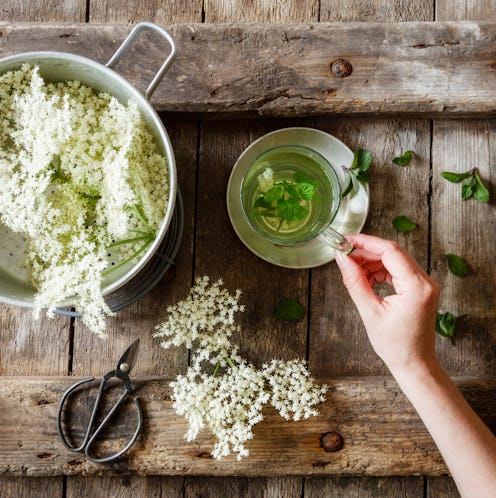Health
You Finished Dry January. Now What?
Here’s comes after 31 days booze-free.

You've had a month of relaxing peppermint teas and elaborate mocktails — and now you're staring down the rest of the year. Experts tell Bustle that post-Dry January, many people feel motivated to change the way they drink for good; a 2018 study from the University of Sussex found that 80% of people who'd done Dry January felt more in control of their drinking, and a majority were still drinking less six months later.
"In only 30 days of abstinence, you will probably have found that your sleeping pattern has already improved, as has your physical health and energy levels," Sam Hickey, a counselor and addiction treatment program manager at Priory Hospital Woking, tells Bustle. But building on that foundation might feel tricky.
The End Of Dry January Is A Clean Slate
Talkspace therapist Meaghan Rice, PsyD, LPC, tells Bustle that you can take the chance to review how you're feeling after Dry January ends. "For most people, letting go of alcohol for an extended period of time has identifiable positive consequences." Perhaps you've had more time for hobbies, saved some money, or noticed just a bit more energy. She suggests identifying what you'd like to hold onto as a first step towards a new relationship with alcohol.
The next step, she says, is to look at what alcohol does for you. "Get clear about how alcohol has fit into your life, and how you want it to fit into your life," she says. Is it a reward to look forward to, or a stress reliever, or something else? Hickey suggests frankly looking back and examining your alcohol use on a "normal" week before January, and identifying whether you want to maintain or reduce that going forward.
Hickey notes that the weeks after Dry January are also a good time to re-evaluate the role alcohol plays in your emotional health. "While alcohol comes with the façade of offering relief after a hard day or providing comfort if you are experiencing difficult feelings, remember that alcohol is a depressant." That means it will impact your sleep, and may make you feel physically and emotionally worse. If you're the kind of person who reaches for alcohol when you've had a hard day, Hickey says, post-Dry January months may be a way to change that.
How To Maintain Boundaries Around Drinking
Weekly or monthly drinking limits can help you maintain the structure of Dry January if you found that helpful. "Consider setting some boundaries around your alcohol use," Hickey says. This can mean no more than a certain number of drinks per week, or not drinking on week nights. There's no one-size-fits-all approach, and she recommends not being too hard on yourself. "Don’t set yourself up to feel like you’ve failed by giving yourself a boundary that’s unrealistic."
Some longer dry periods may feel helpful, too. "Perhaps you could think about having a month of abstinence every six months, or more frequently, so that you can continue to embrace the positive impacts that you’re feeling right now," Hickey says.
What If Dry January Was Really Hard?
If you found Dry January really challenging, experienced cravings, and want to return to drinking as fast as possible, addiction specialist Dr. Joseph Volpicelli M.D. Ph.D. tells Bustle, that may mean your relationship with alcohol is becoming dependent. "Like all habits, it is essential to create conditions where it is easy to engage in good habits and difficult to engage in bad habits," he says. He recommends removing alcohol from your home entirely if you can.
If doing this on your own feels too fraught, Rice suggests having an accountability partner. "It can be someone who is struggling in the same way, or just a great friend or partner." And if you're struggling, Dr. Volpicelli says, talking to a professional can be helpful, as can attending group meetings.
If you or someone you know is seeking help for substance use, call the SAMHSA National Helpline at 1-800-662-HELP(4357).
Experts:
Sam Hickey
Meaghan Rice Psy.D. LPC
Dr. Joseph Volpicelli M.D. Ph.D.